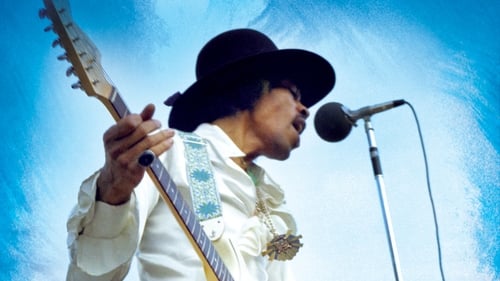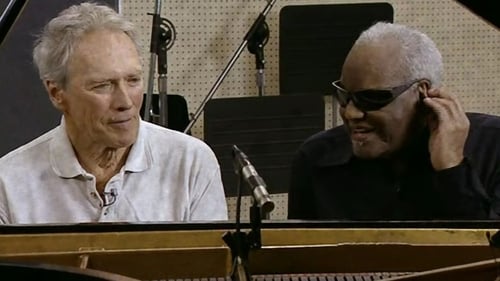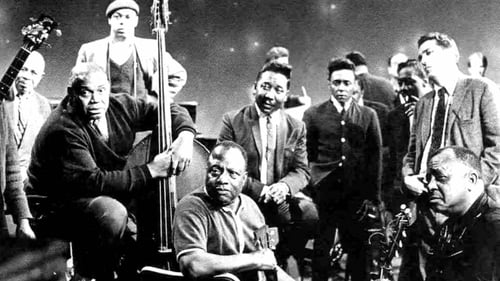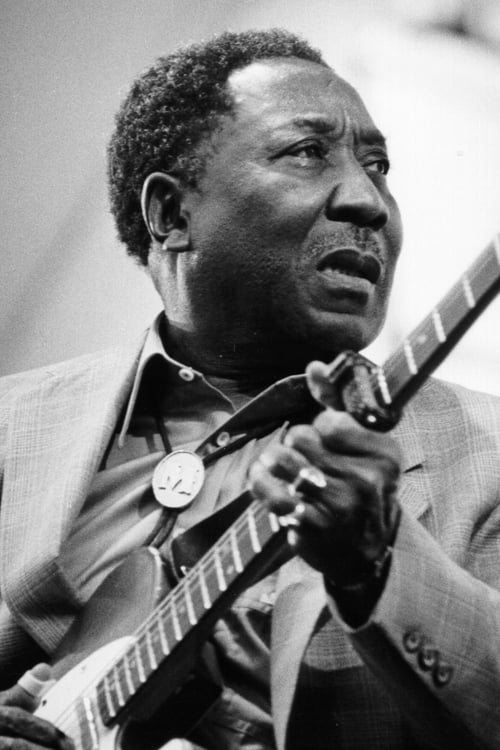Muddy Waters
Birth : 1915-04-04, Issaquena, Mississippi, USA
Death : 1983-04-30
History
McKinley Morganfield, known professionally as Muddy Waters, was an American blues singer-songwriter and musician who was an important figure in the post-war blues scene, and is often cited as the "father of modern Chicago blues." His style of playing has been described as "raining down Delta beatitude."

Self - Musician (archive footage)
An account of the short life of genius musician Jimi Hendrix (1942-70), probably the most talented and influential guitarist of the twentieth century: his humble beginnings in Seattle, his time in New York, his rise to fame in swinging London… Live fast, love hard, die young.

Self
Featuring never-before-seen home movies and photographs, musician Bill Wyman opens up his vast personal archives to share stories and memories of his three-decade stint as bassist of the Rolling Stones.

Quebec, on the cusp of the 1960s. The province is on the brink of momentous change. Deftly selecting clips from nearly 200 films from the National Film Board of Canada archives, director Luc Bourdon reinterprets the historical record, offering us a new and distinctive perspective on the Quiet Revolution.

Muddy Waters fans will welcome this live show of excellent performances, recorded in 1976 for television in Europe. It contains classics like ""Hoochie Coochie Man,"" ""Baby Please Don't Go,"" ""Kansas City,"" and many more. His stellar band features Pinetop Perkins, Luther Johnson, Jerry Portnoy and more.

Self
"Born In Chicago" is a soulful documentary film that chronicles a uniquely musical passing of the torch. It’s the story of first generation blues performers who had made their way to Chicago from the Mississippi Delta and their ardent and unexpected followers – young white, middle class kids who followed this evocative music to smoky clubs deep in Chicago’s ghettos. There, against all odds, they were encouraged by the greats who had became their musical mentors and learned the art of the blues at the feet the masters, going on to make the music their own.

On November 22, 1981, in the middle of their mammoth American tour, the Rolling Stones arrived in Chicago prior to playing 3 nights at the Rosemont Horizon. Long influenced by the Chicago blues, the band paid a visit to Muddy Waters' club the Checkerboard Lounge to see the legendary bluesman perform. It didn't take long before Mick Jagger, Keith Richards, Ronnie Wood, and Ian Stewart were joining in on stage and later Buddy Guy and Lefty Dizz also played their part. It was a unique occasion that was fortunately captured on camera. Now restored from the original footage and with sound mixed and mastered by Bob Clearmountain, this amazing blues night is being made available in an official release for the first time.

Himself
In 1962, a group of legendary American blues musicians embarked on a series of tours to the United Kingdom. Footage from these classic concerts, which feature the likes of Muddy Waters, Lightnin' Hopkins, Junior Wells and more, are collected here. Blues fans will relish appearances by Howlin' Wolf, Sonny Boy Williamson, Lonnie Johnson, Big Joe Williams, Big Joe Turner, Otis Rush ...

Himself

Self
Taken from the European tours organised for American blues musicians between 1962 and 1969, this release features performances by several popular blues artists, including: Big Mama Thornton, Roosevelt Sykes, Buddy Guy, Dr. Isaiah Ross, Big Joe Turner, Skip James, Bukka White, Son House, Hound Dog Taylor and Little Walter, Koko Taylor and Little Walter, Sonny Terry and Brownie McGhee, Helen Humes, Earl Hooker, and Muddy Waters.

Self
One weekend in November, 1971, bluesfreak, Link Wyler and his buddies from the Gunsmoke TV crew, gave in to temptation. On production hiatus, they bolted Hollywood to go and film Muddy Waters, Big Mama Thornton, Big Joe Turner and George "Harmonica" Smith, who were then barnstorming the U.S. Pacific Northwest with their bands.

Himself

Performer
Documentary film about the legendary blues club in Austin, Texas. The film is filled with historical and dynamic blues performances from the earliest days of the club in the 1970s. Stars David Adelson, Clifford Antone.

Self
A legendary concert featuring some of the most well known blues songs of all time. Recorded live at the Montreux Jazz Festival! Switzerland in 1974. This film captures on DVD some of the most influential and endearing musicians of the century. Chicago Blues legends Muddy Waters, Buddy Guy and Junior Wells.

Himself
Arguably second only to Muddy Waters among the Mississippi Delta singers who traveled north and pioneered urban electric blues (their supposed rivalry is the subject of one of this DVD's bonus features), Wolf was a big, imposing man with an inimitable, booming voice and a lasting influence on generations of rock & rollers--all of which comes across in the 90-minute film.

Self
1. It's My Life Baby 2. Rock And Roll Hoochie Koo 3. Stranger 4. Sweet Papa John 5. Life Is Hard 6. Mannish Boy 7. Tell The Truth 8. Love, Life And Money 9. Mad Dog 10. When You Got A Good Friend 11. Don't Take Advantage Of Me 12. The Mojo Boogie 13. Highway 61 Revisited 14. First Blues No.2

Filmmaker Robert Gordon captures the life of fascinating blues artist Muddy Waters. Credited with inventing the electric blues, Waters left an indelible mark on both his contemporaries and the generations of musicians that followed him. This documentary includes numerous film clips and interviews with big-name musicians, such as Bonnie Raitt, the Rolling Stones's Keith Richards and blues man Buddy Guy.

Self (archive footage)
Director — and piano player — Clint Eastwood explores his life-long passion for piano blues, using a treasure trove of rare historical footage in addition to interviews and performances by such living legends as Pinetop Perkins and Jay McShann, as well as Dave Brubeck and Marcia Ball.

Himself
Taken from the European tours organised for American blues musicians between 1962 and 1969, this release features performances by several popular blues artists, including: T-Bone Walker, John Lee Hooker, Muddy Waters, etc.

Himself
Muddy Waters peforms in various taped clips during his later years as an elder statesman of the Chicago Blues.

A travelogue through the Mississippi delta searching for the heart and the spirit of the blues.

Self (archive footage)
In 1966, CBC Television invited some of North America's greatest blues performers to gather in a studio in Toronto, recording together and individually in sessions that lasted three days. The result was originally televised as part of the CBC "Festival" series, and now the session video tapes have been found, restored and re-edited. The great Muddy Waters and his band perform "You Can't Lose What You Never Had" and "Got My Mojo Workin'," the latter with James Cotton on harmonica. Willie Dixon goes solo on "Bassology" and (helped by a little '90s technology) performs "Crazy for My Baby" with host Colin James. Plus rare appearances by Sonny Terry and Brownie McGhee, Mable Hillery singing "How Long This Train Been Gone," and delta blues piano player Sunnyland Slim, introducing a whole new generation to this inspiring, soulful music.

Self (archive footage)
Blues as a genre shaped the sound of jazz in the early 20th century and directly led to the creation of rock 'n' roll in the '50s. The scales, chords, and progressions of blues as a musical form can be found in styles from jazz to rock to contemporary R&B.

guitar, vocals
At Westfallenhalle Dortmund on December 10, 1978 for the Rockpalast recording, Muddy Waters mighty vocals and his splendid charisma on stage fascinated the audience. Muddy's guitar play on Fender Telecaster comes into full effect with his slow bues solos - and seldom had Muddy hadsuch a hot sound.

Self
Martin Scorsese's documentary intertwines footage from "The Band's" incredible farewell tour with probing backstage interviews and featured performances by Eric Clapton, Bob Dylan, Joni Mitchell, Van Morrison, and other rock legends.

Eric Clapton and his band toured Europe by train in 1978, and a documentary called "Eric Clapton and his Rolling Hotel" was filmed, but never released. Clapton put his band in a three-carriage train, originally at the disposal of Hermann Goering during the Nazi years in Germany, and traveled from town to town on the continent, from one concert to the next. It was an easy way to transport and house the band and equipment, and it offered ample opportunity for interviews, groups interactions, and filming. Clapton talks about his music and his works and peaks the viewers interest with stories about musicians like Hendrix and George Harrison. The interviews are supplemented with performances by Muddy waters, Elton John and George Harrison, as well as Clapton and his band. Tracks featured are Cocaine, Further On Up The Road, Lay Down Sally, Tulsa Time, Worried Life Blues, Early in the Morning, Badge, Wonderful Tonight, Key to the Highway, Double Trouble, Crossroads and Layla.

Vocals, Guitar

Self/Performer
In July 1974, a group of Chicago based blues artists who had already achieved legendary status gathered together with some of their younger "blues brethren" from all over the country to pay tribute to the man most responsible for bringing blues from the Mississippi Delta upriver to Chicago, Muddy Waters. Appearing with Muddy that night were his contemporaries Willie Dixon, Koko Taylor, Junior Wells and Pinetop Perkins, and from the next generation of blues lovers and performers, Mike Bloomfield, Buddy Miles, Johnny Winter, Dr. John, and Nick Gravenites -- all artists who were on their way to becoming legends themselves. What resulted from that joyous teaming was a truly historic session that not only presented some of the greatest blues classics ever written, but a never-to-be-forgotten hour that truly demonstrates the love of music by one generation for another.

A look at the Rock and Roll music industry in Canada.

Harley Cokeliss's Chicago Blues filmed in 1972 was a remarkable film; remarkable in that it was not just a competent documentary but a film crafted with care by professionals with a love and understanding of music and a respect for its history and artists. The music and its artists of Chicago Blues reflect faithfully the structure of the city's Blues activity of the late '60s from unknown amateur to world famous stars, from house to small bar, from traditional down home to modern city style. Thus Johnny Lewis, a housepainter who played for his own amusement at home and was almost a discovery of the film team, to Muddy Waters, Chicago Blues' most famous figure.

A 16 minute short comprising 2 acts of a 1964 event where an innovative group of musicians performed on a real railroad track. The audience on one side of the tracks and the musicians on the station side.

UK TV Movie of blues performances from many of the greats.






